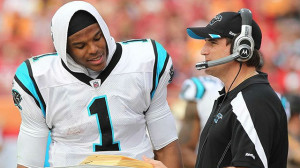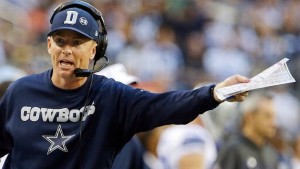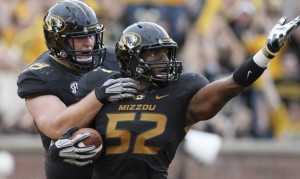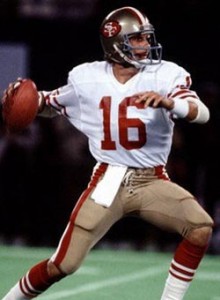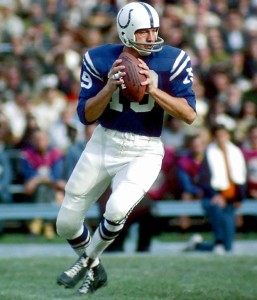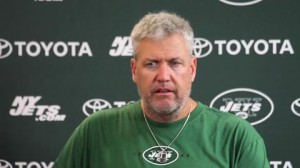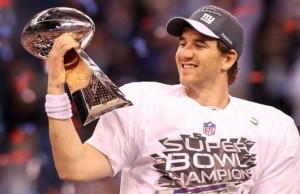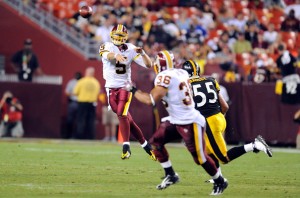The next day, unproven rookie Cameron Jerrell Newton signed a completely fair 4-year, $22M contract, with a team option for a fifth year at a cost-controlled rate. No really, it was completely fair, at least according to Pro Football Talk: [continue reading…]
In twelve seasons in Houston, Andre Johnson gained 13,597 receiving yards. Johnson was drafted by the Texans with the 3rd overall pick in 2003, and has played every game of his career with Houston. That will change in 2015, as Johnson signed with the Colts in March.
Does that sound like a lot of yards to you? Put it this way: only Jerry Rice and Marvin Harrison have ever gained more yards in a 12-year period with one team. And Johnson is as synonymous with Houston as any wide receiver has been with any team (including Reggie Wayne, who Johnson will be replacing in Indianapolis). [continue reading…]
With greatness comes backlash, and every great player has collected his share of detractors. And while Football Perspective readers don’t underrate him, it feels as though Emmitt Smith has been remembered by a significant number of football fans as a less-than-special running back. He played with Hall of Famers at quarterback and wide receiver, with Pro Bowlers at fullback, tight end, and several spots on the offensive line. As a result, it’s understandable that some diminish the peak numbers he produced during his prime.
And yes, he did put up some monster numbers during his prime. From 1991 to 1995, Smith was historically dominant. Consider that among all running backs during their ages 22 through 26 seasons (i.e., Smith from ’91 to ’95), he rushed for 8,019 yards; the next closest player during those ages was LaDainian Tomlinson with 7,361. Smith also rushed for 85 touchdowns: Tomlinson (72) is the only other player within 20 rushing touchdowns of Smith during those ages.
But let’s say you don’t want to give Smith “full credit” for those years. What about what he did from 1998 to 2001? During those years, Chan Gailey and Dave Campo coached the team for two seasons each. Dallas went 28-36 during those years, and the passing attack ranked 17th in Net Yards per Attempt. In other words, these weren’t the Troy Aikman/Michael Irvin Cowboys. And while Larry Allen was still around, the offensive line was more name than substance at this point.
At the start of this four-year period, Smith was 29 years old. Through age 28, Smith had recorded 2,595 carries in the regular season, [1]In addition to 318 more in the playoffs. the most of any player through age 28 in NFL history. So you’ve got a situation where a running back had been worn down to an absurd degree, stuck on a mediocre team and on a mediocre offense. If Smith was not a special back, how would he do? [continue reading…]
References
| ↑1 | In addition to 318 more in the playoffs. |
|---|
I waited patiently all week, but it appears no one else has the guts to write what needs to be written: it’s time for the Cowboys to fire Jason Garrett.
On Sunday, the Dallas Cowboys hosted the Detroit Lions in the first round of the playoffs. The Cowboys were the more talented team, and were favored by 6.5 points to win the game. And, despite Garrett’s best efforts, the Cowboys did manage to escape with a victory. But Garrett’s blunders nearly cost the team not once, but twice, and there’s little evidence to indicate that Garrett has learned from his mistakes. If the Cowboys ever want to win a Super Bowl, the team needs to move on from Garrett.
Mistake #1
With just under four minutes left in the 3rd quarter, the Cowboys trailed the Lions, 17-7. On 3rd and goal from the 1-yard line, Garrett called a running play for DeMarco Murray, who was stuffed by Ndamukong Suh for no gain. Given that the Lions have the best run defense in football, this isn’t too surprising.
Trailing by 10, the Cowboys obviously still needed two scores, so the correct move, of course, is to take the three points. Yet despite this being the sort of basic math that a third grader could decipher, Garrett essentially took the three points off the board and chose to go for it on 4th down. [continue reading…]
Here is graphic video of a famous football player performing an act of cowardly violence against a defenseless victim. The offender did not receive any penalty for his actions. After committing that crime, the assailant showed no remorse at the condition of the victim, who lay prostrate on the ground. Not disciplined for earlier acts of violence, that player struck again, this time paralyzing his defenseless victim. That victim would eventually die far too young, in part as a consequence of that attack.
For this perpetrator, the response was much worse than insufficient punishment or radio silence. Jack Tatum was celebrated for many of his hits, perhaps most notably the one on Sammy White in Super Bowl XI. The Ray Rice punch makes all of us cringe, but the hit on White―and even more so the one on Darryl Stingley ― should also make us cringe. [continue reading…]
One of the darkest weeks in NFL history continued on Friday; judging by the details of the report of what Adrian Peterson did to his four-year old son, perhaps escalated is a better description.
Peterson. Ray Rice. Greg Hardy. Ray McDonald. The biggest stories of the 2014 season have been about domestic violence. This, after the Richie Incognito-led bullying effort in Miami dominated parts of the 2013 season. And it’s not as though the Jovan Belcher and Aaron Hernandez stories are in the distant past, either.
I don’t know exactly how many fans are questioning what the hell is going on with the NFL. I know I am. Here’s what Mike Tanier had to say earlier this week, identifying exactly why Rice was indefinitely suspended from the league. [continue reading…]
That not a peep was heard, through a 12-2 season and a Cotton Bowl victory, says more about football’s readiness to accept gay players than thousands of speculative words. — Michael Tanier, Sports on Earth
By now you know that Michael Sam, a star defensive end at Missouri, is set to become the first openly-gay, active NFL player. Regular readers know that I rarely use this platform to criticize other writers. But an article by Pete Thamel and Thayer Evans discussing how Sam’s sexual orientation will cause his draft stock to drop is worthy of a deviation from my general rule. [Update: A reader sent me a great article by Stefan Fatsis that goes into further detail on the failure of SI in this story. Go ahead and read his article and then come back; don’t worry, this article will still be here.]
[Sam’s] decision to come out prior to May’s NFL draft will make his path to the league daunting, eight NFL executives and coaches told SI.com.
In blunt terms, they project a significant drop in Sam’s draft stock, a publicity circus and an NFL locker room culture not prepared to deal with an openly gay player. Sam, the SEC Defensive Player of the Year, was projected as a mid- to late-round draft pick prior to his announcement.
While none of the executives overtly condemned Sam’s decision, their opinions illuminated an NFL culture in which an openly gay player — from the draft room to the locker room — faces long odds and a lonely path.
The executives and coaches were granted anonymity by SI.com for their honesty. Their answers were consistently unsparing.
At first glance, it felt odd that — in an article asking NFL executives and coaches for honest information — Thamel and Evans did not even mention the fact that NFL executives and coaches do not volunteer honest information to the media about a draft prospect in February. But after reading the full article, it’s easy to see why that omission occurred. Sam’s draft status is not the point of the article; rather, his stock is simply a vehicle to “inform” us that the NFL has a culture that will not accept an openly gay player. Then, in what I would consider to be a reprehensible bit of journalism, Thamel and Evans focused exclusively on those who bashed anonymously and made no effort to find those who would praise Sam publicly.
What does it mean to say that we are a decade or two away from being “ready” for an openly-gay player? What does Unnamed Personnel Assistant expect to happen between now and 2029 that will make the NFL “ready” for an openly-gay player? What does being “ready” even mean? Nate Burleson, Sheldon Richardson, and countless other NFL players have publicly praised and supported Sam, which I guess is not as insightful as to the dynamic of an NFL locker room as the anonymous musings of Unnamed Personnel Assistant.“I don’t think football is ready for [an openly gay player] just yet,” said an NFL player personnel assistant. “In the coming decade or two, it’s going to be acceptable, but at this point in time it’s still a man’s-man game. To call somebody a [gay slur] is still so commonplace. It’d chemically imbalance an NFL locker room and meeting room.”
More shockingly, how could Thamel and Evans not touch the “football is a man’s man game” line? Is the journalistic standard so low that we may tacitly approve of the implication that gay men are not manly men because an anonymous executive said as much? I would not have that quote under my byline, but that’s just me.
Kudos to the investigative powers of Thamel and Evans to discover that gay slurs are commonplace in the locker room. As we have learned from the Richie Incognito–Jonathan Martin scandal, so are racial slurs. Would Thamel-Evans and/or the anonymous personnel assistant say we are not ready for racially integrated locker rooms?
When the anonymous executive said that a gay man would chemically imbalance a locker room, a responsible journalist would ask what the hell that means. Based on the apparent lack of any follow-up question, it appears that neither Thamel nor Evans did as much, and were instead happy to get their soundbite.
“I just know with this going on this is going to drop him down,” said a veteran NFL scout. “There’s no question about it. It’s human nature. Do you want to be the team to quote-unquote ‘break that barrier?'”
The first question you might have after seeing those quotes is why is a veteran NFL scout not being asked for his thoughts on Michael Sam the football prospect. Your second question should be in regards to why Thamel and Evans chose to run a quote about where Sam will be drafted from a scout and not an executive, although you can probably answer that question yourself. As to the scout’s question, I think that answer is pretty obvious: several teams would want to be the team to break that barrier. The Patriots appear to be one, and the Lions, Giants, and Packers all publicly stated that they would welcome Sam on their team. So either Thamel and Evans are such incompetent journalists [1]I’ll note that this is a legitimate possibility. that they couldn’t find a source in time to publicly say as much, or they simply weren’t interested in finding one.
If Sam is among that group of [similarly-rated] players, the potential distraction of his presence — both in the media and the locker room — could prevent him from being selected.
“That will break a tie against that player,” the former general manager said. “Every time. Unless he’s Superman. Why? Not that they’re against gay people. It’s more that some players are going to look at you upside down. Every Tom, Dick and Harry in the media is going to show up, from Good Housekeeping to the Today show. A general manager is going to ask, ‘Why are we going to do that to ourselves?'”
The former general manager said that it would take an NFL franchise with a strong owner, savvy general manager and veteran coach to make drafting Sam work. He rattled off franchises like Pittsburgh, Green Bay, San Francisco, Baltimore and Indianapolis as potential destinations. The former general manager added that a team with a rookie head coach would not be an ideal landing spot.
Artificially creating a small market for a player is Smoke Screen 101, an issue that Thamel and Evans never discuss. To the larger point, there is an element of truth that some general managers are going to break ties against Sam. But the two journalists appear to be interested in muckraking and little more. Consider the questions left unasked:
- Are there any teams that will break ties in favor of Sam? Will certain owners or general managers be attracted to the prospect of positioning himself as this generation’s Branch Rickey, the general manager who signed Jackie Robinson? Almost certainly.
- What is the media’s responsibility and role in this story as the medium becomes the message. The media’s coverage of Sam seems likely to impact the very events — i.e., his draft stock, and perhaps his career — the media is covering. This, along with any concomitant moral responsibility that may or should be attached to such reporters, is a worthy topic for discussion that is instead ignored.
- If teams break ties against Sam, is that appropriate? Is such a decision acceptable, or worthy of our condemnation? Again, Thamel and Evans are mind-bogglingly silent on this point. And let’s not confuse being neutral with being unbiased. The distinction between reporter and columnist is already blurred when picking and choosing your anonymous sources. I would have gained respect for Thamel and Evans had they followed that quote with a paragraph along these lines: “We don’t doubt that some decision makers in draft rooms across the country will break ties against Sam. That’s unfortunate, but we understand that general managers with tenuous job security are hesitant to take the road less traveled. That doesn’t make it right, but we acknowledge that many people lack the courage to be implements of social change, and that’s true even when they’re jobs aren’t on the line. Still, it is hard not to be disturbed by a system that would see Sam’s draft stock fall because of his declaration.”
But, of course, there was no such paragraph. And then, incredibly, Thamel and Evans found more ways to be horrible.
Sam’s announcement did not come as a surprise to most NFL teams. Sam’s sexual orientation was considered an open secret in his college town of Columbia, Mo., and the assistant personnel man said he believed “90 percent of teams” were already aware that Sam was gay and had dropped him on their draft boards. He estimated that of the 32 NFL franchises, only two or three didn’t know prior to Sunday night’s news. He projected that it will impact Sam’s draft status “quite a bit.”
…
Multiple NFL executives questioned Sam’s decision to come out now, as he will be the biggest story in football between now and the NFL draft on May 8. The NFL combine from Feb. 22-25 could turn into a four-day referendum on Sam’s professional future. And his place in the NFL draft will be endlessly debated between now and May.
Those ellipses in between the two paragraphs represent just one omitted paragraph. I make note of this, because apparently Thamel and Evans forget what they wrote two paragraphs earlier. Nearly every team knew that Sam was gay, all of his college teammates knew, and many in Columbia were aware, too. Is it really hard to understand why Sam would want to take control of his destiny? Sam’s sexual orientation was already known, and was going to be a topic of conversation. He risked his status being leaked to the public, with Sam then being forced to respond to such rumors. Shouldn’t we applaud his decision to own his truth? By coming out — literally — and letting the world know, Sam chose to be proactive and aggressive, character traits previously were assumed to be well-received by NFL executives and coaches, even anonymous ones.
It is hard to overstate the importance of a gay person’s decision to come out. According to the American Psychological Association: “Coming out is often an important psychological step for lesbian, gay, and bisexual people. Research has shown that feeling positively about one’s sexual orientation and integrating it into one’s life fosters greater well-being and mental health. This integration often involves disclosing one’s identity to others; it may also entail participating in the gay community. Being able to discuss one’s sexual orientation with others also increases the availability of social support, which is crucial to mental health and psychological well-being.”
Was that too challenging for Thamel and Evans to discover? Were they unable to come up with an answer when asked why Sam chose to make his announcement right before the time when a draft prospect’s mental and psychological well-being gets stressed the most? The decision to come out has unique implications for African Americans, so much so that the Human Rights Campaign has published a resource guide on the subject specifically geared for African Americans. The guide opens with this quote from a Howard University student: “Fear can be paralyzing and can often trap you in silence. It’s the fear of going against our religious upbringing, of losing friends and families, and of shattering the dream that most parents have for us as children. But I have found that coming out has not only strengthened the bonds I have with the people in my closest circle, but has also made me feel whole and complete as a person. The day I chose to live without regret or shame was the day I chose to really live.”
If anonymous executives want to criticize Sam for the timing of his decision of choosing to live his life without shame or regret, their opinions are as valuable as the names attached to them. It was not unintentional that I did not link to Thamel and Evans’ article. But I will link to another article at CNN SI, a much more worthy one from the always terrific Stewart Mandel.
References
| ↑1 | I’ll note that this is a legitimate possibility. |
|---|
Super Bowl XLVIII was the nightmarish end to the dream season had by Peyton Manning and the Broncos. After the greatest scoring season in NFL history, Denver’s high-powered offense was held to just 8 meaningless points against one of the greatest defenses in NFL history. Great players have been having bad games on the biggest stages since the beginning of sports. But the NFL world has a unique reaction when that player is Manning; for him, every loss is yet another building block on his Narrative(TM).
When Tom Brady leads the greatest scoring offense in NFL history to 14 points against a defense that allowed 22 points per game during the regular season, it does not become part of his narrative. When Joe Montana leads the 49ers to just three points in back-to-back playoff losses to the Giants, those games are pushed to the footnotes section of his biography. When the favored Colts were shut out by the Browns in the 1964 NFL title game, that goose egg did not become indelibly intertwined with the legacy of Johnny Unitas. Our memory of Otto Graham‘s 1953 season is that it was one of the greatest quarterback seasons in football history, even if he went 2/15 for 20 yards with no touchdowns and two interceptions in a losing effort in the NFL title game. We remember Sammy Baugh as one of the greatest players ever, forgetting that he was the face of an embarrassing 73-0 loss to the Bears in the 1940 championship game. For most quarterbacks, ugly playoff performances are quirks of history; for Manning, they become bullet points in a character assassination.
Mike Tanier already discussed the silliness that surrounds Manning’s career. Detractors have played “move the goal posts” for nearly two decades with Manning, beginning with his high-profile losses in college. Even after Manning seemingly silenced the last anti-Manning argument, his detractors just invented a new game.
He led his team to a Super Bowl victory. He began to reliably beat Brady’s Patriots. Instead of installing Manning’s legacy behind shatterproof glass, we just juggled harder. One Super Bowl victory, plus another loss, simply isn’t enough for this particular player! The bar for true greatness is multiple Super Bowl victories, an easy standard to set if you are a Patriots fan or a television analyst who shared a locker room with Troy Aikman! It’s a wonder we did not go back and retroactively demand an Orange Bowl or two.
Today’s post is not written to make you feel bad for Peyton Manning. You should not. But the question that has been repeatedly asked over the last three weeks – What is Peyton Manning’s legacy? – is one that is easy to answer. His legacy is that he’s the greatest quarterback ever. That’s not a very exciting answer in the world of #HOTTAKES, but it’s the truth.
We’re past the point of debating how valuable Manning has been in the regular season. Two years ago, I concluded that Manning was the greatest statistical quarterback in NFL history, and that’s before he even donned a Broncos uniform. That analysis didn’t consider how the Colts fell from Super Bowl contender to worst team in the league in the span of one Manning injury. That analysis didn’t consider that in his first year with the Broncos, Denver set the record for the largest year-to-year increase in completions, because that result was preordained. That analysis isn’t based on the MVPs, the All-Pros, the Pro Bowls, or anything but the numbers. I’ll re-run the study this summer, but the only question is how much farther ahead of the competition Manning’s increased his lead.
Attacking Manning’s numbers is a fool’s errand. As a result, as Manning’s regular season production has taken on mythic proportions, the anti-Manning crowd has begun to use that success as a sword. He’s the best regular season quarterback of all time, they will say, emphasizing those two words as if they were agents of disease.
Manning’s teams have struggled in the playoffs. Manning has struggled some, too, although not nearly as much as some believe. Is it surprising that Manning has an 11-12 career playoff record? I suppose so, because we’re at the point that literally every single time Manning loses a game we are surprised. Over the last nine seasons, there have been just seven games where Manning’s team lost as an underdog. [1]This excludes three meaningless end-of-year games where Manning was the nominal starter before sitting on the bench for the rest of the game, and the Colts were underdogs for precisely that reason. … Continue reading A Manning loss is an event, a mystery to be solved, a bat signal for the Manning truthers to emerge.
Some — perhaps many — will argue that Manning is not the greatest quarterback ever. Instead of Manning, that title should be reserved for Montana, or Brady, or Unitas. With Montana, the argument always goes back to the #4RINGZ (although you rarely hear about Bart Starr and his #5RINGZ). As a football historian, I find it disheartening that Montana is mostly remembered as a four-time champion, because he was one of the greatest regular season quarterbacks ever. You never hear Montana referred to as one of the greatest statistical quarterbacks or one of the greatest regular season passers, because those are Naughty Words. But Montana was. And he should be lauded for that.
The Montana over Manning argument is simple: Montana is better because he went 4-0 in Super Bowls, while Manning is 1-2. Such hard-hitting analysis ignores the fact that in each of the four seasons Montana won the Super Bowl, the 49ers defense ranked in the top three in either yards allowed, points allowed, or both. For Manning, “only one Super Bowl” is a scarlet letter. The common argument goes, “How could the greatest quarterback ever only win one Super Bowl?” That’s a fair question to ask, but we know the answer: the playoffs are a single elimination tournament where random events happen. Montana threw three interceptions and lost a fumble in the 1981 NFC Championship Game, but the 49ers still won. In Super Bowl XXII, Montana nearly lost the game with a pass that hit Lewis Billups in the hands, but the defensive back couldn’t catch the ball. Montana was a better quarterback in the playoffs than Manning, but he also lost twice as 8+ point favorites. In one of those games, he was benched. Montana may be the second greatest quarterback of all time, but his resume is not beyond reproach.“How could the greatest quarterback of all time win just one championship?” is Manning’s burden to bear, but it’s not hard to frame anti-Montana questions, either. After all, why did he only win two MVP trophies? That question is no more — and no less — fair than the Manning one. How great could Montana have really been if he did not win a single MVP trophy in his first ten seasons? After finally winning the award in back-to-back seasons, his replacement won the same award twice in the next five years? Shouldn’t we expect the greatest quarterback ever to be the best player in his league more than twice? Let Montana win three more MVP awards, and then we can talk about him being better than Manning.
The MVP question isn’t the only one out there. If Montana was so great, how come the Associated Press only named him a first-team All-Pro three times in his career? Shouldn’t the greatest player at his position in NFL history be recognized as the best player at his position more than three times in his career? Manning’s done it seven times! Be named the best player at your position four more times, then talk.
Those who believe Montana or Brady are better than Manning will not be convinced otherwise. I have no interest in yet another Brady/Manning debate. I would not deem it a coincidence that Montana and Brady were coached by Bill Walsh and Bill Belichick, the two best coaches of the last 30 years. I would not be so quick to blame Manning for losing in the Super Bowl, instead of praising him for taking teams coached by Jim Caldwell and John Fox to the big game. Brady, like Montana, has won just two MVPs. He was only a first-team All-Pro selection twice in his career, although he has a good excuse: he was competing with Manning nearly every year.
Unitas, as great as he was, doesn’t compare favorably to Manning, because nobody compares favorably to Manning. Technically, Unitas won three titles, but he left Super Bowl V with an injury while the Colts were trailing, and Earl Morrall was the quarterback who led Baltimore’s come-from-behind victory. If that ever happened to Manning, there would be riots in the streets before Manning was credited with that win.As good as Unitas was, nearly every factor points in Manning’s favor. We already know that Manning’s numbers — after adjusting for era — dwarf those of every other quarterback. But other factors tell a similar story. Unitas was a 10-time Pro Bowler and 5-time Associated Press 1st-team All-Pro; those are great accomplishments, but most of those accolades came when the NFL had between ten and sixteen teams, and several franchises employed a quarterback-by-committee approach during that era. Standing out as an elite quarterback was easier back then, but no matter: Manning still has Unitas beat, with 13 Pro Bowls and seven AP first-team All-Pros.
Unitas did not have the sustained success of Manning (he had a pair of down seasons in the middle of his career) nor did his career reach the highest peaks that Manning did in ’04 or ’13. Unitas did not win a single championship in the sixties, and in that era, he was the Manning to Starr’s Brady. Unitas won two titles early and then suffered a long postseason drought. Unitas was a three-time MVP, but that still puts him behind Manning.
Quarterback debates can be silly. We don’t wonder why Barry Sanders never won a Super Bowl. The legacy of Jim Brown wasn’t tarnished even though he didn’t win a playoff game until his second-to-last season. Manning is the greatest quarterback in NFL history. That’s his legacy. He’s earned that label after reaching unparalleled levels of success, by producing at a level well above average, game after game, month after month, season after season. It’s a bit odd that Manning’s teams haven’t had more success in the playoffs, but that’s all it is. Ted Williams never won a World Series, but it doesn’t make him any less of a ballplayer. Even Boston fans can agree with that.
We are told that quarterbacks are different, and that a quarterback is responsible for his team’s success. But constant repetition does not make it so. We’re smart enough to know this; I know we are. We don’t think Russell Wilson is a better quarterback than Manning just because the Seahawks beat the Broncos. But Super Bowl XLVIII just showed that a great team can beat a great quarterback. A great effort by an in all three phases of the game is usually what it takes to beat Manning. Perhaps that is his true legacy, as no quarterback has ever been tougher to beat.
References
| ↑1 | This excludes three meaningless end-of-year games where Manning was the nominal starter before sitting on the bench for the rest of the game, and the Colts were underdogs for precisely that reason. That never happened in 2005 or 2006, but in 2007, against the undefeated Patriots, the Colts were 5-point underdogs and lost 24-20. In 2008, the Colts were 4-point road dogs to the undefeated Titans, and lost 31-21. We skip 2009, and then in 2010, the Colts lost as road dogs to the Eagles and Patriots. In 2012, as post-surgery Manning was working back into GOAT Manning, Denver lose to Atlanta, Houston, and New England in the first five weeks as underdogs. And since someone will ask, Brady has lost as an underdog ten times over that span, excluding the week 17 game against Houston in 2009. |
|---|
At the end of Sunday’s game against the 49ers, the Seahawks had an opportunity to (attempt to) allow the 49ers to score. Following a Colin Kaepernick gainof 8 yards on 3rd-and-7, the 49ers had the ball, down by 1, at the Seahawks 7-yard line with 2:39 remaining. The Seahawks were out of timeouts, which meant if San Francisco wanted to, it could drain the clock to under 30 seconds. Keith Goldner at Advanced NFL Stats already covered this issue well: “Once the 49ers had the 1st-and-Goal, with the impending snap coming under the 2:40 mark, the Seahawks should have immediately attempted to allow the 49ers to score.”
I agree with Keith’s analysis: the Seahawks would have been in a better situation having the ball following a kickoff with 2:30 left in the game, trailing by 5-7 points, than to have been in the desperate situation they were in. But what does coach Pete Carroll have to say about whether it would have been wise to allow the 49ers to score a touchdown?
“There’s a lot of gut in that decision…We had the talk, and it’s just not in our mentality to let anybody have anything….I’m going to do a little research this week and see if anyone has ever done that and won,” Carroll said.
I don’t think we need to go beyond Keith’s analysis, which correctly frames the issue. We don’t need to look at historical numbers to know that trailing by 5-7 with the ball on your own 22 with 2:30 left is better than trailing by 2 with the ball on your own 22 with 26 seconds remaining. But since coach Carroll used to coach the Jets, I figured I would do him a solid and provide him with a history lesson. [continue reading…]
I’m no Mark Sanchez apologist. But that doesn’t mean he’s the only one to blame for the Jets’ passing game struggles.
The Supporting Cast
Jeremy Kerley, Dustin Keller, Chaz Schilens, Stephen Hill, and Jeff Cumberland are the team’s leading receivers. Clyde Gates has started two games at wide receiver. Kerley would be a great #3 receiver, but he’s the Jets #1. Schillens and Gates are best left as fifth receivers, while Stephen Hill is incredibly raw and has struggled most of the year. Keller would be a good tight end on a good passing offense, but is overmatched as the team’s #2 target. I don’t think anyone would disagree that the Jets’ receivers (including stone-hands Shonn Greene) rank in the bottom five of the league.
Mike Tannenbaum
Tannenbaum has come under heavy criticism from Jets fans of late. While I think much of that is probably unfair, there are several areas to point the finger at Tannenbaum — starting with drafting Sanchez in the first place. The Jets general manager listens to eternal optimist Ryan too much when it comes to personnel decisions, which led the Jets to start Wayne Hunter at right tackle last year and enter the pre-season with him, somehow, still entrenched at the spot. The Vlad Ducasse pick has been a bust, leaving Matt Slauson to cover at left guard (you know, when he’s not being rotated out of the game). Trades for Braylon Edwards and Santonio Holmes yielded immediate dividends, but have only added to the disruption in the locker room without helping the 2012 version of the team. Sanchez is playing with one of the worst supporting casts in the league, so the man who picks the talent certainly bears some of the blame.
There are very few head coaches who are excellent on both sides of the ball, but Rex Ryan is one of the most specialized head coaches in the NFL. He’s a defensive mastermind — no doubt about that — but he’s as helpless on offense as he is strong on defense. He vowed this year to get more involved in the offense, which should start sending red flags to begin with since 2012 is his fourth season as head coach of the team. To the extent that he has been more hands on in 2012, the results aren’t any better.
Perhaps Ryan is the mirror image of a Gary Kubiak, who took awhile to find the right man to run the other half of his team. But from the standpoint of developing a quarterback, Ryan may even be counterproductive. The red light-yellow light-green light system he gave Sanchez in his rookie season was Ryan’s first attempt to right the ship and a sign of what the coach expects out of the quarterback position. The bottom line is Ryan is focused on playing good defense and running the ball, and as long as his quarterback doesn’t mess up, he thinks his team will win. That’s not the ideal environment for a young quarterback to blossom in, and we learned exactly what Rex thinks about his quarterback when this off-season he chose to hire as his offensive coordinator…
Tony Sparano (hat tip, Brian Schottenheimer)
[continue reading…]
I’ve got a real post ready for tomorrow, so Thursday is Rant Day this week. There’s been a lot of talk this week about how this would be a great year to implement the four-team playoff that’s coming to college football for the 2014 season. I suspect part of that reason is because people are recognizing that Florida boasts a more impressive resume than either Alabama or Georgia, and that Oregon is an elite team that lost an overtime game to a division rival. Therefore, a four-team playoff featuring Notre Dame, the eventual SEC Champion, Florida, and Oregon would be great.
On one hand, of course it would be great. I’d love to watch Notre Dame face Oregon and perhaps see Alabama and Florida face off (no, you couldn’t make me watch Florida-Georgia II). But that’s only because college football is great. In fact, this year — like almost every year — stands as a good example of why the four-team playoff system is doomed to create controversy and do little to increase fairness. Let’s start with…
Winning your division = Bad
We saw this last year, when Alabama ended the year as BCS #2 and therefore had locked up its spot in the national championship game, while LSU still had to go play in the SEC Championship Game. In this particular case, I don’t feel too bad about the fact that Florida would be given a free pass to the four-team playoff while Georgia has to go play Alabama, but only because Florida has faced a much tougher schedule.
But what if instead of what actually happened — Florida beating South Carolina, South Carolina beating Georgia, and Georgia beating Florida — the order was reversed, and Georgia beat South Carolina, South Carolina beat Florida, and Florida beat Georgia? In that case, Florida would likely be #2 or #3 in the BCS, while Georgia would sit pretty at 4. And Florida would go play Alabama for the right to win the SEC… with the loser being left out of the playoffs. That’s patently unfair. Being the third best team in your conference could be preferable to being the second best team. This is a lock to happen at some point during a four-team playoff. This is also going to be a bigger problem generally as conferences get bigger, because conference schedules will become unbalanced. The Big 12 has a round robin where everyone plays everyone, but in a 14-team conference, you can easily see a better team end up with a worse record than an inferior team due purely to scheduling.
Oregon-Stanford
It is being conveniently forgotten that Stanford actually won the Pac-12 North. In fact, we have an exact reversal of what happened last year, which many screamed was unfair to Oregon. Lest you forget….
In 2011, both Oregon and Stanford went 8-1 in the Pac-12. Oregon beat Stanford head-to-head in Palo Alto (but lost to USC), so they won the division and then the conference. Stanford had a soft nonconference schedule while Oregon traveled to Dallas to play and lose to LSU in the season opener. So Oregon was 11-2 (but Pac-12 champs) while Stanford was 11-1. After the regular season, Stanford was 4th and Oregon was 5th in the AP, Harris, and Coaches Polls, and also in the BCS. This struck many as unfair, because the Ducks were essentially the better team but had a brutally hard non-conference game, a de facto road game against the #1 team in the country.
Fast forward to 2012. Oregon and Stanford both went 8-1 in the Pac-12. This time, Stanford beat Oregon head-to-head — in Eugene — so they won the division and perhaps the conference (we’ll find out on Saturday.) Oregon had a soft nonconference schedule while Stanford went to South Bend to play the #1 team in the country. Stanford will finish 11-2 if they beat UCLA, while Oregon finished 11-1.
Should Oregon go to the hypothetical four-team playoff instead of Stanford? If not, why not?
[continue reading…]
1) Eli Manning, New York Giants. If to be the man you have to beat the man, well, Eli Manning is now the man. Nobody has ‘it’ in the 4th quarter quite like Eli, which is when ‘it’ becomes really important.
3) Peyton Manning, Denver Broncos. If ‘it’ was Tapenade, Manning would be first on the list.
4) Ben Roethlisberger, Pittsburgh Steelers. With two Super Bowl rings, Roethlisberger arguably has more ‘it’ than Manning, but to be fair, Peyton Manning does hold the record for the most 4th quarter comebacks.
5) Drew Brees, New Orleans Saints. Despite gaudy numbers, Brees kind of doesn’t have that much ‘it’, in my opinion. But I’m not sure who else could go ahead of him.
6) Aaron Rodgers, Green Bay Packers. The last of the quarterbacks with rings, as Rodgers has one of the worst records in history when it comes to 4th quarter comebacks.
7) Tim Tebow, New York Jets. Without question, in possession of more ‘it’ than any quarterback without a Super Bowl ring, and maybe even more than some of the ones who do.
8) Alex Smith, San Francisco 49ers. This dude is loaded with ‘it’ and grit and teammates that hit. He went about 20 games without throwing an interception and he nearly completed more than 100% of his passes a couple of weeks ago.
9) Joe Flacco, Baltimore Ravens. If ‘it’ is Ray Lewis, Haloti Ngata, Ray Rice, Lardarius Webb, and Ed Reed, then Joe Flacco has had ‘it’ in spades for years. Let’s not forget he outplayed Mr. It in the AFC Championship Game last year, a particularly notable feat since both quarterbacks were playing against identical defenses.
10) Robert Griffin III, Washington Redskins. It doesn’t matter that his team loses, he has ‘it’ until the first game he struggles in 2013.
[continue reading…]
Everyone knows the preseason is meaningless. The coaches do, the players do, and the fans do. There is no simpler way to explain it than this: the main goal is not winning. It’s trying out new plays. Or staying healthy. Or avoiding showing too much. Or seeing how a certain formation, route, or play, works. Or seeing how a player responds to an event. But winning is never the main goal.
But as much as I can’t stand watching the preseason (but still do), what I really can’t stand is reading people talk about how good (or bad) a player or team looks in the preseason. It’s about the most meaningless piece of data one could ever cite, although of course some will say differently. There are those who believe if you know what to look for you can get meaningful information out of preseason games. To them I say, good luck.
As Exhibits A through Z, I present to you, Ryan Leaf.
There weren’t any apparent opening-night jitters for Ryan Leaf.
The touted rookie quarterback from Washington State came out poised and led two scoring drives – capping one with an impressive 3-yard TD pass to Bryan Still – and the San Diego Chargers beat San Francisco 27-21 in their exhibition opener last night.
Leaf made a few mistakes, like throwing into double coverage at the goal line – Still actually drew a pass-interference call on that one – and not getting off a play in time during the two-minute drill.
Otherwise, Leaf had a better night than Steve Young.
The 22-year-old Leaf, taken with the second pick in the April draft and named the starter for the season on Wednesday, was 14 for 20 for 116 yards.
Here’s another account of his first night:
Ryan Leaf didn’t look at all like a rattled rookie in his NFL debut. Sure, the touted San Diego Chargers quarterback made some mistakes and still has a ways to go in adjusting to the faster pace of the pro game. But was he nervous? Nope. It’s not in his playbook.
…
“He throws so accurately,” coach Kevin Gilbride said. “Even though he was late a few times, he put it in position where the only one who could catch it was us. That was the most encouraging thing…. I don’t want to in any way, shape or form make it seem like he’s where he needs to be. Still, he’s able to make plays and that’s what it comes down to. I thought he did that very, very well.” As he has numerous times this summer, Gilbride called Leaf “special.” Running back Terrell Fletcher called Leaf “a fearless player. That’s a big attribute.”
Leaf said the radio receiver in his helmet, which coaches use to call in plays, didn’t work the first two series. He partially winged it, with help from his teammates and quarterback coach June Jones, who told him to have three or four plays down pat to use. “I think he surprised a lot of people with how composed he was,” guard Raleigh McKenzie said. “We went three-and-out the first series, then he got real poised. He knew what to do in there.”

